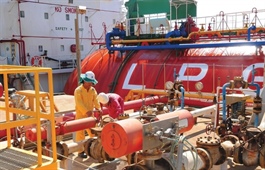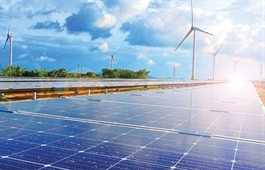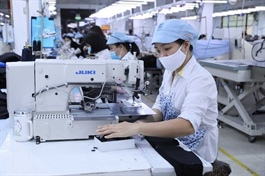Carbon credit market can make all the difference
Carbon credit market can make all the difference
In Vietnam, the carbon market will be developed and operated under strict government supervision, emphasising the principles of transparency, publicity, efficiency, national suitability, and alignment with international practices.

Lam Nguyen Hoang Thao, associate, Russin & Vecchi |
In June, Vietnam will launch a pilot operation on domestic carbon trading. During this period, the legal framework governing the organisation and operation of the carbon market will be refined. In 2029, an official market will be established.
The domestic carbon market facilitates trading of two primary products: greenhouse gas (GHG) emission quotas and carbon credits. Emission quotas are allocated to large emitters to cap their allowable emissions. On the other hand, carbon credits are generated by businesses through verified green projects that reduce or remove GHG emissions.
According to the current draft decree on the domestic carbon market, carbon credits eligible for trading must be certified by the Ministry of Agriculture and Environment (MoAE). They must meet approved domestic or international standards. Examples include carbon credits obtained under international carbon offset and trading mechanisms such as the clean development mechanism, the joint crediting mechanism, and the mechanism under Article 6 of the Paris Agreement.
According to rules on mitigation of emissions and protections for the ozone layer, organisations or individuals wishing to have certification of traded carbon credits or GHG emission quotas shall submit an application to the MoAE through the online public service. Within 15 working days, the MoAE shall organise verification, issue the certificate, and send a notification to the applicant; if the application is rejected, an explanation will be provided.
The application for carbon credit approval under the draft decree must include detailed programme or project documentation; a technical or appraisal report from an independent evaluation agency; and certified copies or originals of permits and relevant professional documents, as required by current regulations.
Entities that trade in Vietnam’s market must have trading accounts. Emission quotas and carbon credits to trade, once registered by the MoAE, will be assigned a unique domestic ID code to facilitate transactions. This code is exclusive and cannot be duplicated. The registration and issuance of such codes will be centrally managed to ensure data consistency, synchronisation, and compliance with regulatory requirements.
With the oversight and support of the Ministry of Finance and the MoAE, the Hanoi Stock Exchange will become the recognised carbon trading exchange. The Vietnam Securities Depository and Clearing Corporation will be responsible for custody and transaction settlement services.
Entities eligible to trade on the exchange include large GHG-emitting facilities that are listed and allocated emissions quotas. Relevant sectoral ministries have proposed annual quota allocations for each facility under their management. The MoAE compiles and submits the total national GHG quotas for each phase and year to the prime minister for approval, before distributing the quotas to the entities.
In the first phase of 2025-2026, approximately 150 large emission facilities in three sectors, thermal power, steel production, and cement, are expected to be allocated emission quotas. The emissions from these facilities account for about 40 per cent of the country’s total emissions.
These three sectors are also subject to the EU’s Carbon Border Adjustment Mechanism. Reducing emissions in these sectors can simultaneously enhance competitiveness of Vietnamese products in the EU.
Other entities allowed to participate in carbon credit transactions include organisations implementing domestic or international carbon credit projects, individuals and organisations meeting legal requirements may invest in or trade carbon credits in accordance with environmental regulations.
Currently, businesses are awaiting action from state authorities to advance the development and operation of the carbon market. Key actions include setting total GHG emission quotas for each phase and year and distributing these quotas to facilities mandated to perform GHG reduction.
Additionally, clear and detailed regulations must be established to define criteria for carbon credit verification, management, and the possibility of transferring carbon credits overseas during the pilot phase. Businesses also expect the government to introduce mechanisms to assess and certify carbon credit exchange and offset programmes at the national level.
For carbon credits that are currently available, the government should validate their eligibility for trading on the domestic carbon exchange. The government should also finalise regulations for auctioning GHG emission quotas, as auctions are scheduled to begin in 2029.
- 14:00 10/05/2025



























